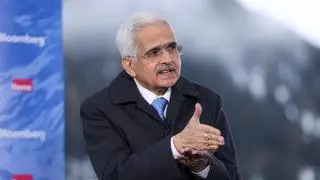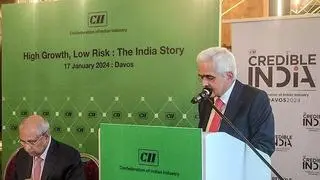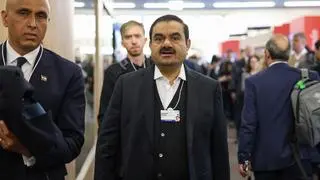The World Economic Forum (WEF) is bringing together a network called ‘Food Innovation Hubs, to strengthen local innovation ecosystems and achieve self-sufficiency in food production through private-public partnerships (PPP).
The hubs are coming up in Columbia, Vietnam, the United Arab Emirates and the European Union, while efforts are on to set up in Kenya and Rwanda, said Jaskiran Warrik, Lead, Food Innovation Hub India, WEF.
The food innovation hubs are multi-stakeholder, neutral partnership platforms that will leverage the role of technology and broader innovations in support of a transformation agenda that leads to more inclusive, efficient, sustainable, nutritious, and healthy food systems.
Promoting innovations
“In India, the current focus for the hub is on Madhya Pradesh. We have signed a collaboration agreement with the Madhya Pradesh government on agricultural development. The State is keen on promoting innovations in alignment with its agenda targeting AtmaNirbharata,” said Warrik said in online interaction.

Jaskiran Warrik, Lead, Food Innovation Hub India, WEF
The Food Innovation Hub in India aspires to enable a mechanism that can strengthen local innovation ecosystems and address needs across the food value chains using technology and innovation, she said.
The innovation hubs depend on one another for knowledge exchange with a Global Coordinating Secretariat in Holland ensuring that every hub is functioning as per global objectives, besides acting as a stimulant, she said.
As one of the first Hubs to be set up, all eyes are on India. There is no direct funding from the WEF for initiating projects under the hub, but it works closely with the government and private sector to meet its goals. In this, it enables PPPs by roping in agtech companies and linking them with government agencies such as Krishi Vigyan Kendras or agriculture departments and other like-minded partners.
Proof of concept
“These agtech firms work to create a proof of concept with the government. We always try to build a solid case in this before moving forward,” Warrik said.
Various agtech firms can be part of a project providing a variety of cutting-edge solutions — from pledge financing through fintech modalities to using spectrometers to perform quality assaying, or even using remote sensing to providing advisories and facilitating efficient crop insurance. Besides agtech firms, not-for-profit companies are also involved to enhance the reach and credibility of digital innovations at the last mile.
One reason why Madhya Pradesh was chosen for initiating the hub’s work was that it was open to exploring opportunities transparently and collaboratively. “The State set aside different department officials and looked for convergence with government programmes. It was ‘fertile’ ground to work,” Warrik said.
The Food Innovation Hubs will focus on digital agriculture, which is receiving a lot of attention these days, but also on innovations in regenerative farming and agro-ecological solutions. It will look at several modern and traditional models to address climate resilience besides looking at upcoming innovations in carbon offsets, which if implemented well can prove critical to providing financial incentives to the farmers to grow more sustainably.
Carbon credit
“The carbon credit market is becoming big globally and India can benefit with a well thought out execution plan. There are firms which are already in India and others that want to come and start business operations that aim to pass on the benefits of protecting ecosystem services to farmers,” the WEF India Food Innovation Hub official said.
Other innovations that are on the horizon include the usage of targeted soil and crop management through drones and spraying of bio-chemicals on fresh produce that may enhance shelf life and thus arrest food loss, both of which are conducive to the environment and support nutrition and health in the long term, she said.
The initiative aims to facilitate pilot projects to validate and test innovations, particularly by agtech companies, and support them in achieving scale and amplification in the future, Warrik said.
The Madhya Pradesh government has taken up several initiatives on food and agriculture and all are fed into a bigger strategy. “The implementing models have been initiated in Madhya Pradesh and Telangana (through Saagu Bagu). Madhya Pradesh has received the title of Most Improved Big State in Agriculture at the State of States Conclave in 2021 for the fourth year in a row. It is a frontrunner and is keen on proving the concept and taking innovations forward,” the WEF official said.
Philanthropic funds
In India, philanthropic funds are also coming forward to take part in these projects. “These funds are looking to unlock the PPPs by providing initial funding, particularly in achieving proof of concepts. Philanthropic partners are an integral part of initiating and accelerating ecosystem transformation,” Warrik said.
Once India’s Food Innovation Hub builds a solid case, WEF would look at extending its work to Odisha, Bihar, Uttar Pradesh, and Meghalaya, she said.









Comments
Comments have to be in English, and in full sentences. They cannot be abusive or personal. Please abide by our community guidelines for posting your comments.
We have migrated to a new commenting platform. If you are already a registered user of TheHindu Businessline and logged in, you may continue to engage with our articles. If you do not have an account please register and login to post comments. Users can access their older comments by logging into their accounts on Vuukle.